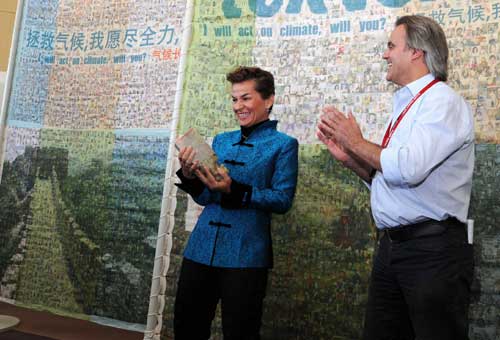Global General
Developed countries urged to act
By Li Xing, Li Jing and Lan Lan (China Daily)
Updated: 2010-10-05 07:39
 |
Large Medium Small |
TIANJIN - Calls for concerted global efforts to combat climate change resonated on the first day of a new session of United Nations climate talks, which opened in China's coastal city of Tianjin on Monday.
 Christiana Figueres (left), the executive secretary of the United Nations Framework Convention on Climate Change, stands in front of a poster of the Great Climate Wall of China after marking it with a traditional Chinese seal ahead of the opening session of the UN Climate Change Conference in Tianjin on Monday. [Photo/Xinhua] |
The weeklong talks were convened at short notice because the secretariat of the United Nations Framework Convention on Climate Change (UNFCCC) hoped a last round of negotiations between governments would help deliver tangible progress at the upcoming United Nations Climate Change Conference, which will start in Cancun, Mexico, on Nov 29.
| ||||
"Governments need to agree on what is doable in Cancun and how it will be achievable in a politically balanced manner," she said. She added that "it is in everyone's ultimate interest to accelerate action in order to minimize negative impacts on all".
China's State Councilor Dai Bingguo also pointed out the urgency.
"All countries need to renew efforts to consolidate and expand consensus and hammer out a legally-binding agreement at an early date," Dai said during his address at the opening ceremony.
Figueres asked negotiators to focus on areas with broader consensus, so as to deliver "a balanced package of decisions" at Cancun.
These decisions will be the "corner stones" in the fight against warming, she said at a press conference on Monday.
Areas to be focused on include a fresh international framework to help small developing island states and least developed countries adapt to climate change. Another area of focus is the launch of a new mechanism to provide technology to developing nations.
Figueres said that some $28 billion had already been committed by developed countries toward the $30 billion in fast-start finance that will assist mostly developing countries in mitigating the effects of climate change between 2010 and 2012.
Meanwhile, negotiators have also smoothed the way toward decisions for a new fund for money raised in the long-term to help developing countries. The money will also help protect forests and the livelihoods of those who live in them.
However, major political gaps exist between the developed and developing countries.
For instance, many developed countries who are signatories to the Kyoto Protocol "no longer want to make a commitment inside the Kyoto Protocol", according to a circular by the Third World Network, an independent non-profit international alliance of organizations and individuals involved in development issues.
There have been proposals to re-classify countries or differentiate among developing countries, said Ambassador Abdullah M. Alsaidi, head of the delegation from the Republic of Yemen, who made a statement on behalf of the Group of 77 and China on Monday.
"The Group of 77 and China believes that such proposals do not advance our work and could, in fact, be counterproductive," he said.
In his opening remarks, China's State Councilor Dai stressed that the principles of "common but differentiated responsibilities", as well as UNFCCC, the Kyoto Protocol and the Bali Road Map, have formed the legal basis and framework for international action on climate change.
Developed countries are expected to take the lead in making substantial efforts to reduce their greenhouse gas emissions and flesh out arrangements for providing adequate financial and technological support to developing countries. They will also be expected to help developing countries take active measures to adapt to and mitigate climate change, said Dai.
He defined a win-win outcome from the Cancun talks as one that will ensure climate action is taken while also ensuring developing countries have the right to develop.
Representatives from international NGOs expressed hope that government negotiators will work hard to resolve differences.
"We want parties (governments) to focus on those aspects where decisions are possible, because we need to show progress in order to rebuild the confidence for this UN system," said Raman Mehta, ActionAid's program manager in India. "And the major moves should come from developed countries, fortunately or unfortunately."
Jennifer Morgan, director of the Climate and Energy Program at World Resources Institute, told China Daily on Monday that making progress is paramount.
"In each key area, such as adaptation, technology, finance, accounting and transparency, and mitigation, countries should identify the areas of consensus and set those aside in order to tie up the one or two top political issues in each area," she said. "They need to demonstrate their deep willingness to find solutions and move forward in a productive manner."
Citing the areas that are close to agreement, Angela Anderson, from the US Climate Action Network, said: "These are also important tools for countries to tackle global warming and build a new world based on non-fossil fuel energies."
More than 3,000 people from at least 176 countries and regions have registered to take part in the Tianjin climate meeting. Delegates include representatives from governments, business and industry, environmental organizations and research institutions as well as more than 150 journalists.
Meanwhile, TckTckTck, an alliance of environment, development and faith-based NGOs, youth groups, trade unions and individuals, has used its website to mobilize more than 17 million people around the world to send a message to the governments calling for action to mitigate the effects of climate change.



